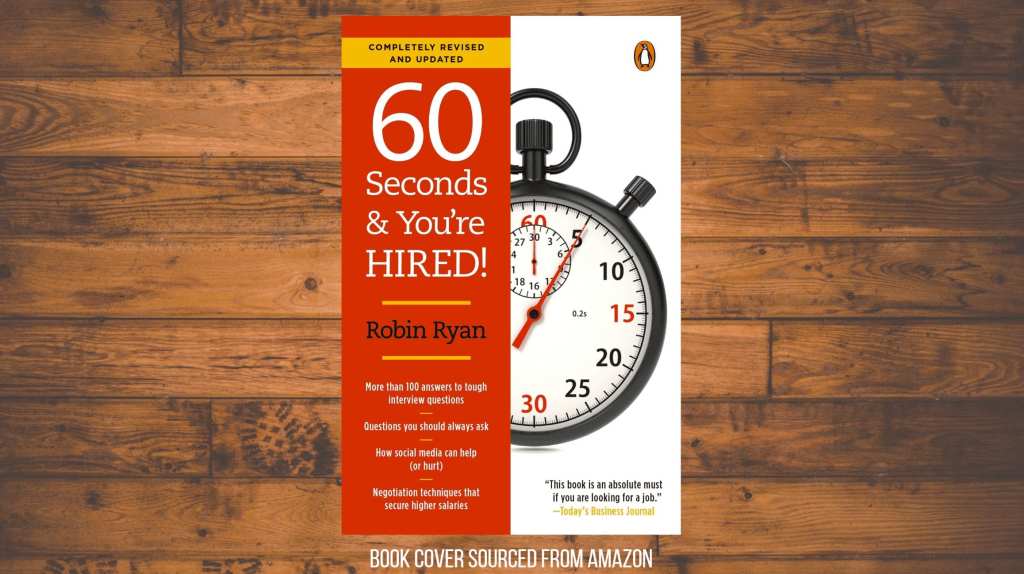This post may contain affiliate links, which means I’ll receive a commission if you purchase through my links, at no extra cost to you. Please read full disclosure for more information.
ABOUT
- Title: 60 Seconds and You’re Hired!: Revised Edition
- Author: Robin Ryan
- About the author: Robin Ryan is a bestselling author and more than qualified in sharing advice related to careers. She has 30+ years of hiring experience and works as a career counselor. Robin has helped thousands of clients. She has been featured in countless newspapers, magazines, and TV and radio shows. Her qualifications and accolades exceed the limit for this short bio.
- Pages: 224
- Published: 2016
- Link to book
HIGH-LEVEL SUMMARY

This version of 60 Seconds and You’re Hired! is the revised and updated version. The book is an essential guide on how to ace interviews and land your dream job. The author, Robin Ryan, has decades of experience in the field and is considered a top career expert.
This book caters to those interviewing from the start of their career all the way to those interviewing for C-level positions. Robin discusses her tactical techniques like “The 60 Second Sell” and “The 5-Point Agenda” to equip interviewers with the tools to capture interest and highlight their strengths as a candidate.
Other key aspects of the book include:
- How to answer 125+ common interviewing questions
- Current hiring trends
- Current salary trends
- Interviewing etiquette
- Salary and compensation package negotiations
- 20 of the biggest interviewing pitfalls to avoid
- The 13 types of interviews
- Questions you should ask as the interviewer
- Interview preparation
The book is brief and compact, but delivers all you need to take your interviewing skills to the next level.
RECOMMENDATION
From my personal experience, there are a handful of good books out there on interviewing. This is one of them. I would recommend this to anyone in the hunt for a job. You can be a college student looking to get hired for their first internship or a professional that is 15 years into their career.
The information provided is applicable to interviews for any job in any field. 60 Seconds and You’re Hired! is just north of 200 pages. This is an easy read and is jam-packed with information. A small amount of time invested in learning how to interview and negotiate can result in the job of your dreams and the highest salary you can earn.
Personally, I don’t think I would have ended up on the career path I have had so far without solid interviewing skills. I was never the top candidate on paper, but I focused on making up for that during the interviews.
TOP 20 TAKEAWAYS
** In no particular order*
1. Employers want to know if you can do the job, if you will do the job, and if they would be able to manage you.
2. The 60 Second Sell is a tool to capture attention and spark an employer’s interest. It will summarize your skills, abilities, and previous experience in a well thought out pitch that takes less than 60 seconds to deliver.
3. The 5 Point Agenda is the second main method explained in the book to highlight your strengths as a candidate. Prior to any interview, you will determine your 5 most marketable points and repeatedly illustrate those points throughout the interview process.
4. The 60 Second Sell and 5 Point Agenda will be used together to demonstrate your abilities and qualifications to meet the company’s goals and objectives.
5. You should open the interview and close with your 60 Second Sell. It will capture their attention to start and leave them with a memorable impression when the interview concludes as they fill out their post-interview assessment sheet.
6. The number one complaint from hiring managers is that candidates display poor communication skills such as vague and inarticulate answers.
7. The largest raises in your career will come from changing employers. If you stay with the same company, you can expect 2-5% annual raises. When you change employers, this raise can be 15-20%.
8. Companies evaluate candidates’ current skills, but also the future potential of candidates they are considering. They want broad based skills and adaptable learners that have demonstrated they can grow in future jobs. It’s all about perceived potential.
9. Within the first 10 seconds of meeting you, the interviewer makes a decision on whether you look right for the job. Present yourself well with your appearance and body language. Make a great first impression.
10. After an interview, make sure you deliver thank-you notes. Even further, don’t email them or type them out. Hand write them. This will leave a much greater positive impression. This is rarely done and will set you apart from everyone.
11. The four key components of answering interviewing questions is advance preparation, giving short and concise answers, demonstrating your ability to do the job, and exhibiting traits of their ideal worker.
12. When asked about weaknesses and struggles, always demonstrate how you learned and worked through them. It should always end on a positive note.
13. You should not say anything that would go against the interviewer’s or company’s needs. Think about what the interviewer is looking for in the questions they ask. Don’t bring up things that would imply you can’t do the job.
14. For salary questions, the one who mentions money first loses. Try not to mention a salary number first. You want the employer to do this. You could disqualify or hinder your potential salary by mentioning a number too high or too low.
15. Employers and hiring managers put a lot of weight in the questions candidates ask. Ask insightful questions and send the message that you are truly interested in the job and having success. Go into the interview with a list of questions to ask.
16. You never want to appear that you are in desperate need of the job you are interviewing for. Even if you are, do not show it. Employers don’t want to know that you will take ANY job. They want to know you will take THEIR job specifically.
17. When you are at the stage of negotiating the salary and compensation package, always sell what value you are going to bring and how you will solve their problems.
18. There are 13 types of interviews and it is important to be familiar with each one. They are structured differently and can have different objectives. The interviewee needs to be adaptable depending on the interview type.
19. It is wrong to assume that the person with the best education, skills, and experience will get the job. There are many other factors that come into play when hiring someone. Have confidence and don’t sell yourself short. Always give it your best shot.
20. Use a show-and-tell approach throughout the interview process. Don’t simply say what you can do, but demonstrate it through stories from your prior jobs and experiences. Bring work samples with you as well to show tangible proof. You always want to demonstrate your abilities and past achievements.
WHAT I LIKED

Tactical approach to interviewing
60 Seconds and You’re Hired! is filled with tactical advice for the whole process of interviewing. The title of the book relates to the theme of being able to deliver your selling points and answers in 60 seconds or less, but the book offers much more than that.
There is a method to all the “madness” when it comes to interviewing. Robin Ryan offers advice on how to answer questions, what actions to take before and after, the importance of dressing nicely, body language, and much more.
Advice based on experience and conversations with professionals
The author is a prominent figure in the space of career counseling. She has decades of her own hiring experience and has been well-connected in the space. This enabled her to hear what others have to say about interviewing. This includes professionals that work in the top positions at household-name companies.
With that said, the reader can have faith that the advice shared has been tried and tested. Some things conflicted with what I thought would be the best way to do something.
For example, the book recommends that you should try to be the first or last person interviewed in a group of candidates. I wouldn’t have guessed that going first would be a good thing.
I previously thought that going first would result in the interviewers forgetting about you by the end. The author made good points on why being interviewed in the middle of the group isn’t ideal.
125+ question examples and how to answer them
It’s hard to know how to answer interview questions, but where do you begin once you try to practice? There are hundreds of potential questions that any interviewer can ask.
I liked how the book gave 125+ of the most commonly asked questions. The author explained why interviewers ask these questions, what they are looking to determine, and how you should go about answering.
After reading the book, you’ll have an idea of what goes on in the mind of the interviewer. If you can understand what they are thinking, you can tailor your responses to answer anything the interviewers throw at you.
Shares 20 Pitfalls to avoid
It’s great to know what to do for an interview. Knowing what not to do is equally as helpful.
The book shares around 20 of the biggest pitfalls to avoid. If you can simply avoid doing these things, your chances of being hired skyrocket. Then, if you improve your interviewing skills, the odds tilt even more in your favor.
Touches on salary and promotion negotiations
This book doesn’t just help you get hired, but it also shares advice on negotiating the best salary/compensation package you can.
Companies aren’t going to roll out the red carpet for you to receive the highest salary they are willing to offer. They are going to offer the minimum to get you. Many will accept this minimum. 60 Seconds and You’re Hired! dedicates chapters to this aspect of the interviewing process.
BENEFITS FOR YOUR LIFE AND CAREER

Getting the job you want
The obvious benefit of this book is getting the job you want. Life is too short to work jobs you don’t like. It’d be nice to have your pick at what you want to do.
Interviewing is the 20-foot wall between you and your dream job. You must get over that wall if you want to reach your goal. Interviewing is a skill that needs to be fine-tuned.
Getting the highest compensation package
Next to getting the job you want, getting the most robust compensation package will be your next focus. After reading 60 Seconds and You’re Hired!, you’ll have the knowledge and confidence to successfully negotiate salary, benefits, promotions, etc.
Each raise you get in your career will be based off your previous salary. Securing the highest salary you can with each job is critical, especially early in your career.
If changing jobs results in a 20% salary increase from your previous position, you want that 20% raise to be based off $80,000 and not off $60,000.
Learning to think like the interviewer
When you read the explanations on how to answer one of the 125+ example questions, you’ll understand the point of view of the interviewers and the company. You’ll acquire the ability to think like the interviewer.
This is a key part of interviewing. When you know what interviewers are looking for, you’ll know how to deliver the best answers to highlight your strengths and suit their needs.
Learning to sell
Whether it’s in an interview or not, this book will also teach you how to sell. Rather than thinking like the interviewer, you can use the same logic to think like a client or a customer when selling.
The skills picked up in this book are transferable to other areas of life.
Knowing how to hire the best candidates
For some of our readers, you are at the stage in your career where you are managing a team. For others, you are at the entry-level position of a company. At some point, you will be in charge of hiring your own team.
The book describes the costliness of bad hires. You don’t want that to be you. 60 Seconds and You’re Hired! will benefit you as an interviewer as much as it will benefit you as an interviewee. You will have the knowledge to sift through candidates and identify the best option for you, your team, and your company.
10 ACTIONS YOU SHOULD TAKE
1. Never spend more than 60 seconds on an answer of any question during the interviewing process. You’ll lose the interest of the person you are talking to.
2. Create your 60 Second Sell to summarize your skills, abilities, and previous experience.
3. Create your 5 Point Agenda by selecting your five most marketable selling points. Use this and the 60 Second Sell in conjunction with each other in an interview.
4. When going into an interview, identify what the employer’s “ideal worker persona” is. This is the ideal person they are looking to hire for the position, their team, and the company. Find out what that is and embody it.
5. Put thought and effort into your appearance. The book mentioned a few times that interviewers will judge you within 10 seconds of seeing you. You need to look presentable and confident. The interviewer needs to be able to envision you working with them and representing the company.
6. For the next interview you are in, send hand-written thank-you notes to your interviewers after. Use the interviewers’ business cards if they gave you them. If you didn’t receive one, ask the receptionist on your way out for a way to deliver the notes by mail.
7. Before negotiating your salary, make sure you have established your value first. You want to express what you will bring to the table. This will help your argument for the salary you are seeking.
8. Create a list of insightful questions to bring with you for your next interview. I’d say think of 5 to 10 questions. You may only have time to ask 3 to 5, but have backup questions in case.
9. Regarding behavior, make sure you are smiling, have continuous eye contact, have an open and relaxed body language, and exhibit enthusiasm and confidence.
10. Practice how you’ll open and close your interviews. Use your 60 Second Sell and 5 Point Agenda to nail the beginning and ending of the interview. The beginning sets the tone and your first impression on the interviewers. The close reminds them of why you are the perfect candidate. It also keeps those reasons fresh on their minds before they fill out their post-interview assessment on you.
RESOURCES
60 Seconds and You’re Hired! can be found on Amazon at this link here if you are interested in reading.
Related articles on interviewing and career:
- How to Prepare, Practice, and Study for an Interview: Ultimate Guide
- Top 9 Essential Things To Do Before Your Job Interview
- Top 5 Ways to Succeed During an Interview in 2020
- How to Get an Internship With No Prior Experience
- How to Get an Internship in College: Ultimate Start-to-Finish Guide
- The Financial Analyst Resume: Detailed 2020 Guide
- 25 Phone Interview Tips to Land You a Job



